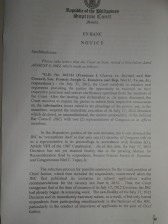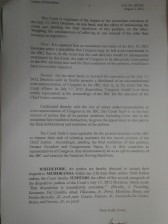SC’s unanimous but interim decision: 2 JBC seats for Congress
MANILA, Philippines—Congress may be allowed to seat two representatives in the Judicial and Bar Council (JBC) for the time being.
In a unanimous but interim decision issued on Friday, the high tribunal suspended the “immediately executory” portion of its July 17 ruling that declared unconstitutional the presence of two congressional representatives in the JBC, thus restricting the legislature to just one seat and one vote, as stated in Article VIII, Section 8 (1) of the Constitution.
It said that pending the final resolution of the issue—the petition of lawyer Frank Chavez questioning the constitutionality of the double congressional representation—Sen. Francis Escudero and Rep. Niel Tupas Jr. may continue to sit as ex-officio members of the JBC and participate in the nomination process for the next Chief Justice.
“The court finds it more equitable for the present members of the JBC to resume their task of selecting nominees for the vacant position of the Chief Justice,” the two-page decision read.
Nine justices, including one of the nominees, Roberto Abad, voted in favor of the decision. Four other justices, who are also nominees, earlier inhibited themselves from the case.
Article continues after this advertisementWait for 4 justices
Article continues after this advertisementThe high court said it would wait until the justices who inhibited themselves are able to participate in the deliberations. This should come after Monday, when the JBC announces its short list of nominees for Chief Justice, from which President Aquino is mandated to make a selection by Aug. 27.
The decision followed the oral arguments held on Thursday to tackle the motion for reconsideration on the July 17 ruling filed by the Senate and the House of Representatives.
The high court also asked the House, the Senate and the petitioner, Chavez, to submit their memorandums on the matter within 10 days.
In their decision, the justices said it was only fair that Escudero and Tupas remain in the JBC for the meantime since they participated in the selection process that started on June 6, when the JBC published its invitation for the submission of nominations and applications for the vacancy.
The high court said it “recognizes” the fact that at the time of issuance of its July 17 decision, the JBC had already begun its screening work.
Apparently in protest against the unfavorable ruling, Senate President Juan Ponce Enrile and House Speaker Feliciano Belmonte directed Escudero and Tupas to stop participating in the JBC deliberations, leaving Congress unrepresented in the interview portion of the proceedings.
“This court is cognizant of the impact of the immediate execution of the July 17, 2012, decision on one hand, and the effect of maintaining the status quo pending the final resolution of this petition, on the other. Weighing the consequences of adhering to one instead of the other thus becomes an imperative,” the high court said.
It said the immediate execution of the July 17 ruling raised the possibility that Congress may be left under-represented in the JBC.
“[I]n the event that the decision would be subsequently overturned by this court, the right of Congress to be adequately represented in the JBC between now and the final resolution of the petition, would have been irreversibly impaired,” it said.
On the other hand, the justices said that to forestall the execution of the July 17 decision until its finality “presents a likelihood” of over-representation of Congress in the JBC.
“[I]n the event that the court affirms its July 17 disposition, Congress would have been overly represented in the proceedings of the JBC for the selection of the Chief Justice nominees,” they said.
“Confronted thereby with the risk of either under-representation or over-representation of Congress in the JBC, this court finds it in the best interest of justice that all its present members, including those who in the meantime have inhibited themselves, be given the opportunity to take part in the final deliberations and resolution of the petition,” the justices ruled.
Escudero to return to JBC
Escudero, the chair of the Senate committee on justice and human rights, on Friday said he would resume attending the JBC deliberations following the high court decision.
“I will attend unless I get instructions to the contrary from Senate President Juan Ponce Enrile,” said Escudero, noting that it was a temporary or interim ruling.
But he said Congress would continue to insist that the Supreme Court recognize the bicameral nature of the legislative branch in matters related to the JBC, “where one cannot represent the other.”
Sen. Francis Pangilinan, who has filed two resolutions in the Senate pressing the two-representatives, two-votes issue, welcomed the resolution of the impasse.
“While it may not have been the long-term remedy we are hoping for, this will serve our need to move on with the selection and voting process,” he said. With a report from Norman Bordadora

